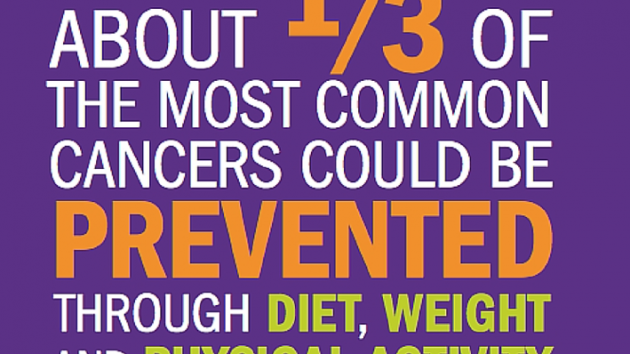After treatment – a word on healthy eating and cancer prevention

Whilst this is a very important topic, it is important to emphasis is that there can be a difference between eating to prevent cancer, and eating when you are in treatment for cancer.
Research has shown that a healthy weight, being active and plant-based dietary approaches may help prevent around 30% of cancers, but, once you actually have the disease, it is still not clear to what extent diet can influence its progress or risks of recurrence.
This is a growing area of research and more scientific studies are needed before we can fully understand the role of diet and lifestyle in the prevention of cancer after recovery from treatments for the disease.
Hence at this time, the recommendations for Eating Well and Being Active are that, after treatment, people who have been treated for cancer should follow the primary cancer prevention guidelines.
WCRF UK’s Recommendation for Cancer Prevention
Be as lean as possible without becoming underweight.
Be physically active for at least 30 minutes every day
Avoid sugary drinks, Limit consumption of energy-dense foods (particularly processed foods high in added sugar or low in fibre, or high in fat)
Eat more of a variety of vegetables, fruits, whole-grains and pulses such as beans
Limit consumption of red meats (such as beef, pork and lamb) and avoid processed meats.
If consumed at all, limit alcoholic drinks to two for men and one for women a day.
Limit consumption of salty foods and food processed with salt (sodium)
Don’t use supplements to protect against cancer
It is best for mothers to breastfeed exclusively for up to 6 months and then add other liquids and foods.
After treatment, cancer survivors should follow the recommendations for cancer prevention
And always remember – do not smoke or chew tobacco
Please be aware that these guidelines will not be suitable for everyone after treatment. If you are underweight, have experienced significant weight loss during your treatment, had surgery affecting your digestive s system, have swallowing difficulties, bowel problems or any other difficulties eating a normal diet, you should ask your doctor, dietitian or specialist nurse if these recommendations are suitable for you. unless you are unable to or have been advised otherwise for health reasons by your doctor, dietitian or specialist nurse.
